Self-Awareness in Leadership: A Reflective Report on Gallup Test
VerifiedAdded on 2023/04/21
|7
|1991
|281
Report
AI Summary
This report is a reflective analysis of leadership strengths identified through the Gallup psychometric assessment. The author evaluates their analytical, restorative, achievement-oriented, focused, and responsible tendencies, connecting these strengths to self-perception and leadership skills. While the assessment highlighted strengths such as analytical thinking and problem-solving abilities, it also revealed areas for improvement, particularly in teamwork and delegation. The report emphasizes the importance of self-awareness in leadership development and outlines a plan for enhancing teamwork skills to improve future leadership effectiveness. References to leadership theories and the importance of teamwork are included to support the analysis. The author concludes that the Gallup psychometric assessment is a valuable tool for self-awareness and self-improvement in leadership.

UNIT:
NAME:
DATE:
NAME:
DATE:
Paraphrase This Document
Need a fresh take? Get an instant paraphrase of this document with our AI Paraphraser
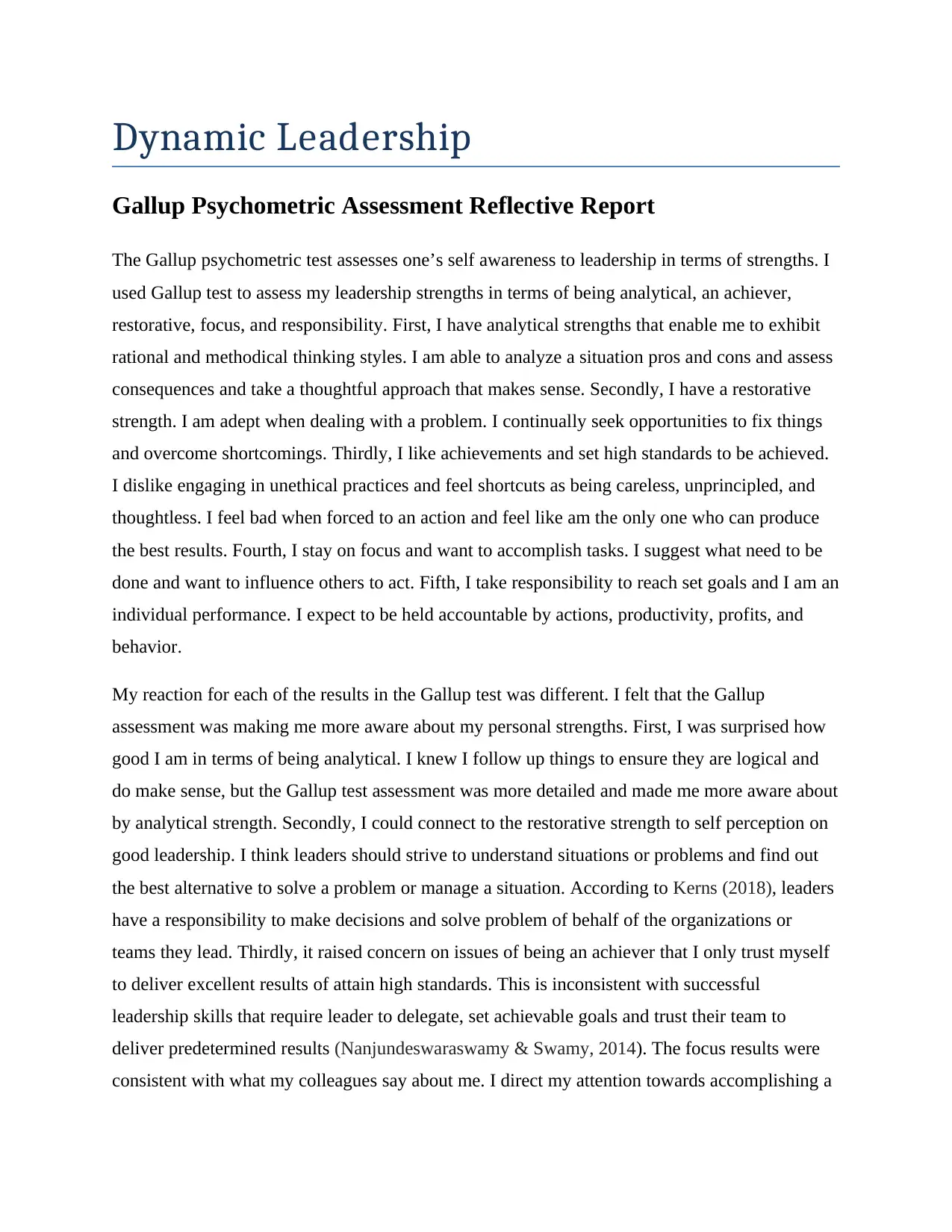
Dynamic Leadership
Gallup Psychometric Assessment Reflective Report
The Gallup psychometric test assesses one’s self awareness to leadership in terms of strengths. I
used Gallup test to assess my leadership strengths in terms of being analytical, an achiever,
restorative, focus, and responsibility. First, I have analytical strengths that enable me to exhibit
rational and methodical thinking styles. I am able to analyze a situation pros and cons and assess
consequences and take a thoughtful approach that makes sense. Secondly, I have a restorative
strength. I am adept when dealing with a problem. I continually seek opportunities to fix things
and overcome shortcomings. Thirdly, I like achievements and set high standards to be achieved.
I dislike engaging in unethical practices and feel shortcuts as being careless, unprincipled, and
thoughtless. I feel bad when forced to an action and feel like am the only one who can produce
the best results. Fourth, I stay on focus and want to accomplish tasks. I suggest what need to be
done and want to influence others to act. Fifth, I take responsibility to reach set goals and I am an
individual performance. I expect to be held accountable by actions, productivity, profits, and
behavior.
My reaction for each of the results in the Gallup test was different. I felt that the Gallup
assessment was making me more aware about my personal strengths. First, I was surprised how
good I am in terms of being analytical. I knew I follow up things to ensure they are logical and
do make sense, but the Gallup test assessment was more detailed and made me more aware about
by analytical strength. Secondly, I could connect to the restorative strength to self perception on
good leadership. I think leaders should strive to understand situations or problems and find out
the best alternative to solve a problem or manage a situation. According to Kerns (2018), leaders
have a responsibility to make decisions and solve problem of behalf of the organizations or
teams they lead. Thirdly, it raised concern on issues of being an achiever that I only trust myself
to deliver excellent results of attain high standards. This is inconsistent with successful
leadership skills that require leader to delegate, set achievable goals and trust their team to
deliver predetermined results (Nanjundeswaraswamy & Swamy, 2014). The focus results were
consistent with what my colleagues say about me. I direct my attention towards accomplishing a
Gallup Psychometric Assessment Reflective Report
The Gallup psychometric test assesses one’s self awareness to leadership in terms of strengths. I
used Gallup test to assess my leadership strengths in terms of being analytical, an achiever,
restorative, focus, and responsibility. First, I have analytical strengths that enable me to exhibit
rational and methodical thinking styles. I am able to analyze a situation pros and cons and assess
consequences and take a thoughtful approach that makes sense. Secondly, I have a restorative
strength. I am adept when dealing with a problem. I continually seek opportunities to fix things
and overcome shortcomings. Thirdly, I like achievements and set high standards to be achieved.
I dislike engaging in unethical practices and feel shortcuts as being careless, unprincipled, and
thoughtless. I feel bad when forced to an action and feel like am the only one who can produce
the best results. Fourth, I stay on focus and want to accomplish tasks. I suggest what need to be
done and want to influence others to act. Fifth, I take responsibility to reach set goals and I am an
individual performance. I expect to be held accountable by actions, productivity, profits, and
behavior.
My reaction for each of the results in the Gallup test was different. I felt that the Gallup
assessment was making me more aware about my personal strengths. First, I was surprised how
good I am in terms of being analytical. I knew I follow up things to ensure they are logical and
do make sense, but the Gallup test assessment was more detailed and made me more aware about
by analytical strength. Secondly, I could connect to the restorative strength to self perception on
good leadership. I think leaders should strive to understand situations or problems and find out
the best alternative to solve a problem or manage a situation. According to Kerns (2018), leaders
have a responsibility to make decisions and solve problem of behalf of the organizations or
teams they lead. Thirdly, it raised concern on issues of being an achiever that I only trust myself
to deliver excellent results of attain high standards. This is inconsistent with successful
leadership skills that require leader to delegate, set achievable goals and trust their team to
deliver predetermined results (Nanjundeswaraswamy & Swamy, 2014). The focus results were
consistent with what my colleagues say about me. I direct my attention towards accomplishing a
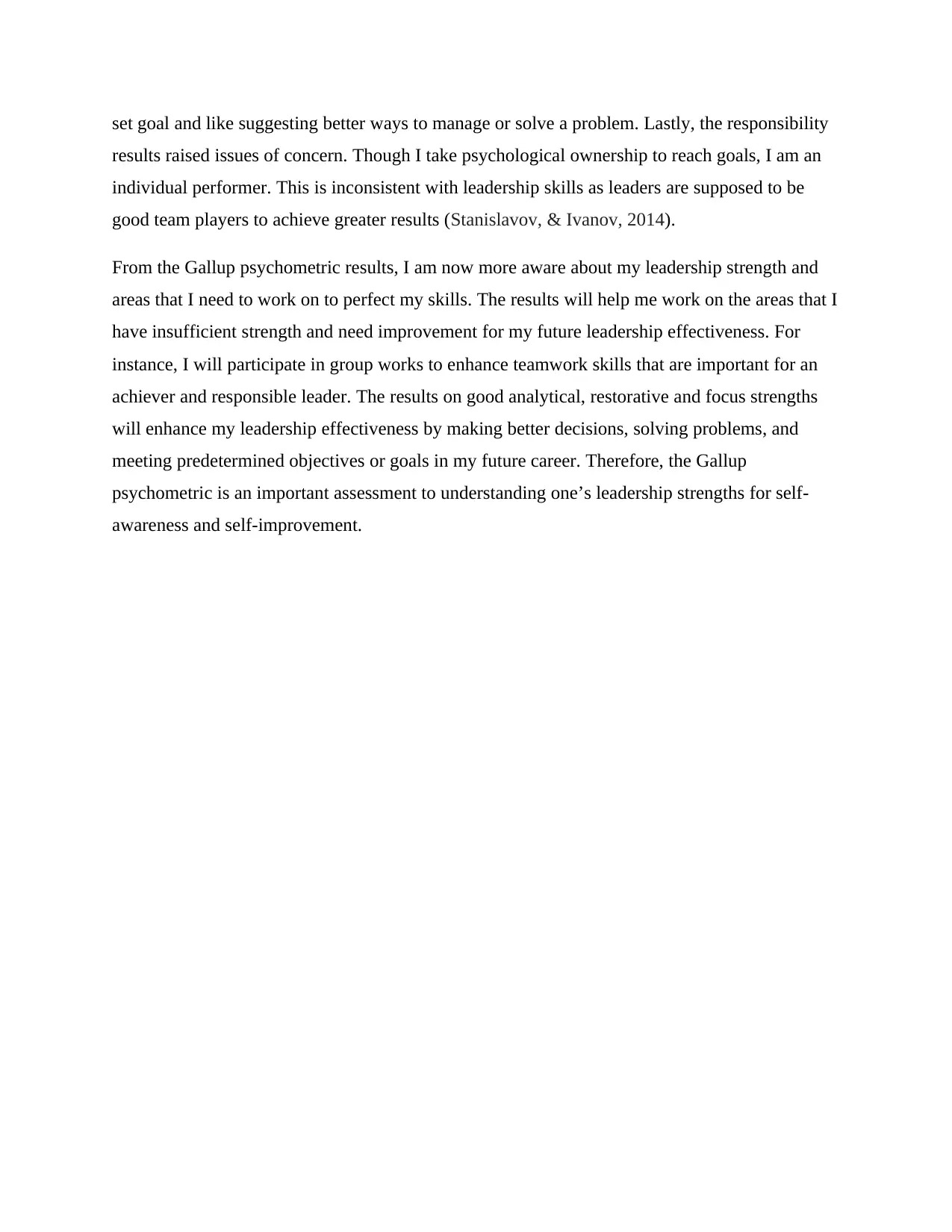
set goal and like suggesting better ways to manage or solve a problem. Lastly, the responsibility
results raised issues of concern. Though I take psychological ownership to reach goals, I am an
individual performer. This is inconsistent with leadership skills as leaders are supposed to be
good team players to achieve greater results (Stanislavov, & Ivanov, 2014).
From the Gallup psychometric results, I am now more aware about my leadership strength and
areas that I need to work on to perfect my skills. The results will help me work on the areas that I
have insufficient strength and need improvement for my future leadership effectiveness. For
instance, I will participate in group works to enhance teamwork skills that are important for an
achiever and responsible leader. The results on good analytical, restorative and focus strengths
will enhance my leadership effectiveness by making better decisions, solving problems, and
meeting predetermined objectives or goals in my future career. Therefore, the Gallup
psychometric is an important assessment to understanding one’s leadership strengths for self-
awareness and self-improvement.
results raised issues of concern. Though I take psychological ownership to reach goals, I am an
individual performer. This is inconsistent with leadership skills as leaders are supposed to be
good team players to achieve greater results (Stanislavov, & Ivanov, 2014).
From the Gallup psychometric results, I am now more aware about my leadership strength and
areas that I need to work on to perfect my skills. The results will help me work on the areas that I
have insufficient strength and need improvement for my future leadership effectiveness. For
instance, I will participate in group works to enhance teamwork skills that are important for an
achiever and responsible leader. The results on good analytical, restorative and focus strengths
will enhance my leadership effectiveness by making better decisions, solving problems, and
meeting predetermined objectives or goals in my future career. Therefore, the Gallup
psychometric is an important assessment to understanding one’s leadership strengths for self-
awareness and self-improvement.
⊘ This is a preview!⊘
Do you want full access?
Subscribe today to unlock all pages.

Trusted by 1+ million students worldwide
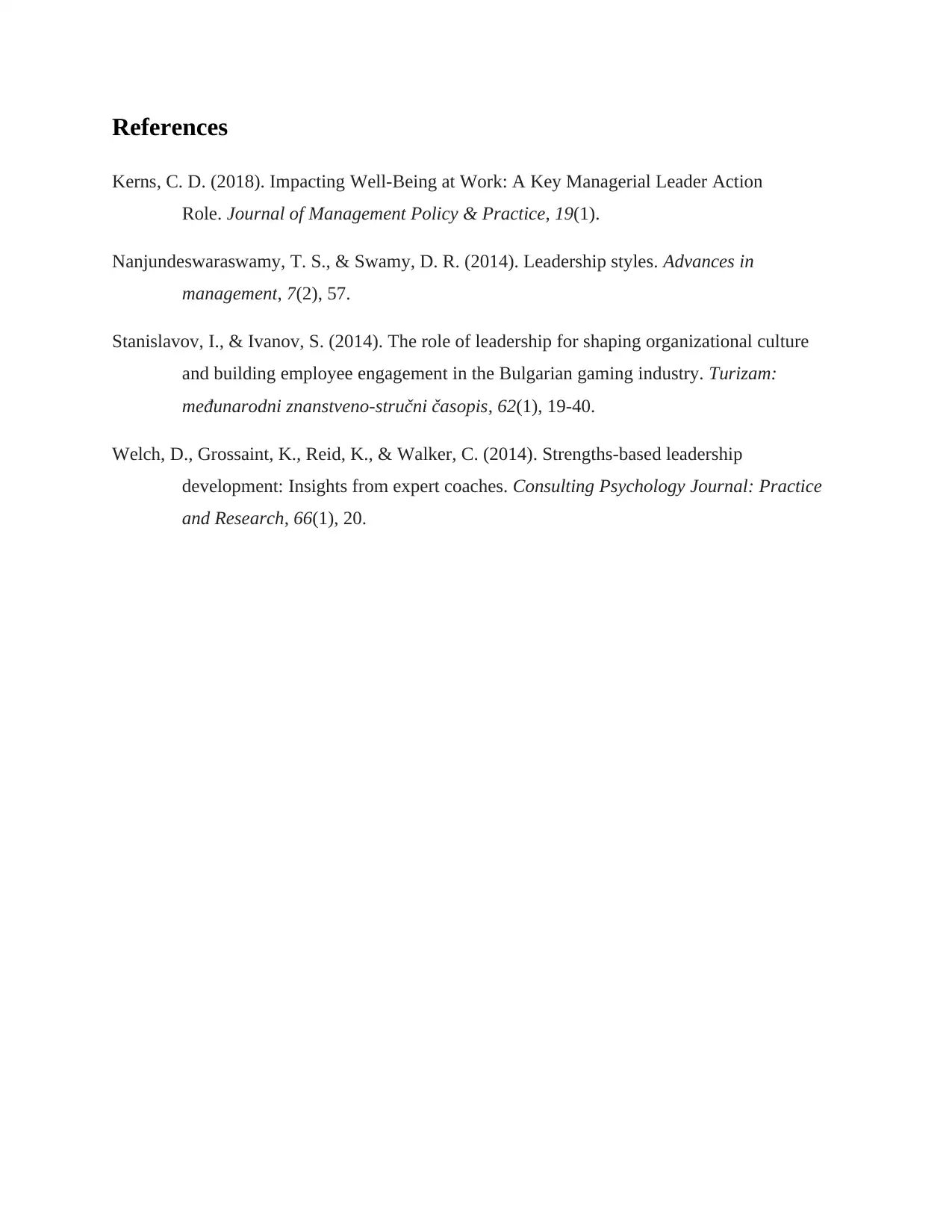
References
Kerns, C. D. (2018). Impacting Well-Being at Work: A Key Managerial Leader Action
Role. Journal of Management Policy & Practice, 19(1).
Nanjundeswaraswamy, T. S., & Swamy, D. R. (2014). Leadership styles. Advances in
management, 7(2), 57.
Stanislavov, I., & Ivanov, S. (2014). The role of leadership for shaping organizational culture
and building employee engagement in the Bulgarian gaming industry. Turizam:
međunarodni znanstveno-stručni časopis, 62(1), 19-40.
Welch, D., Grossaint, K., Reid, K., & Walker, C. (2014). Strengths-based leadership
development: Insights from expert coaches. Consulting Psychology Journal: Practice
and Research, 66(1), 20.
Kerns, C. D. (2018). Impacting Well-Being at Work: A Key Managerial Leader Action
Role. Journal of Management Policy & Practice, 19(1).
Nanjundeswaraswamy, T. S., & Swamy, D. R. (2014). Leadership styles. Advances in
management, 7(2), 57.
Stanislavov, I., & Ivanov, S. (2014). The role of leadership for shaping organizational culture
and building employee engagement in the Bulgarian gaming industry. Turizam:
međunarodni znanstveno-stručni časopis, 62(1), 19-40.
Welch, D., Grossaint, K., Reid, K., & Walker, C. (2014). Strengths-based leadership
development: Insights from expert coaches. Consulting Psychology Journal: Practice
and Research, 66(1), 20.
Paraphrase This Document
Need a fresh take? Get an instant paraphrase of this document with our AI Paraphraser
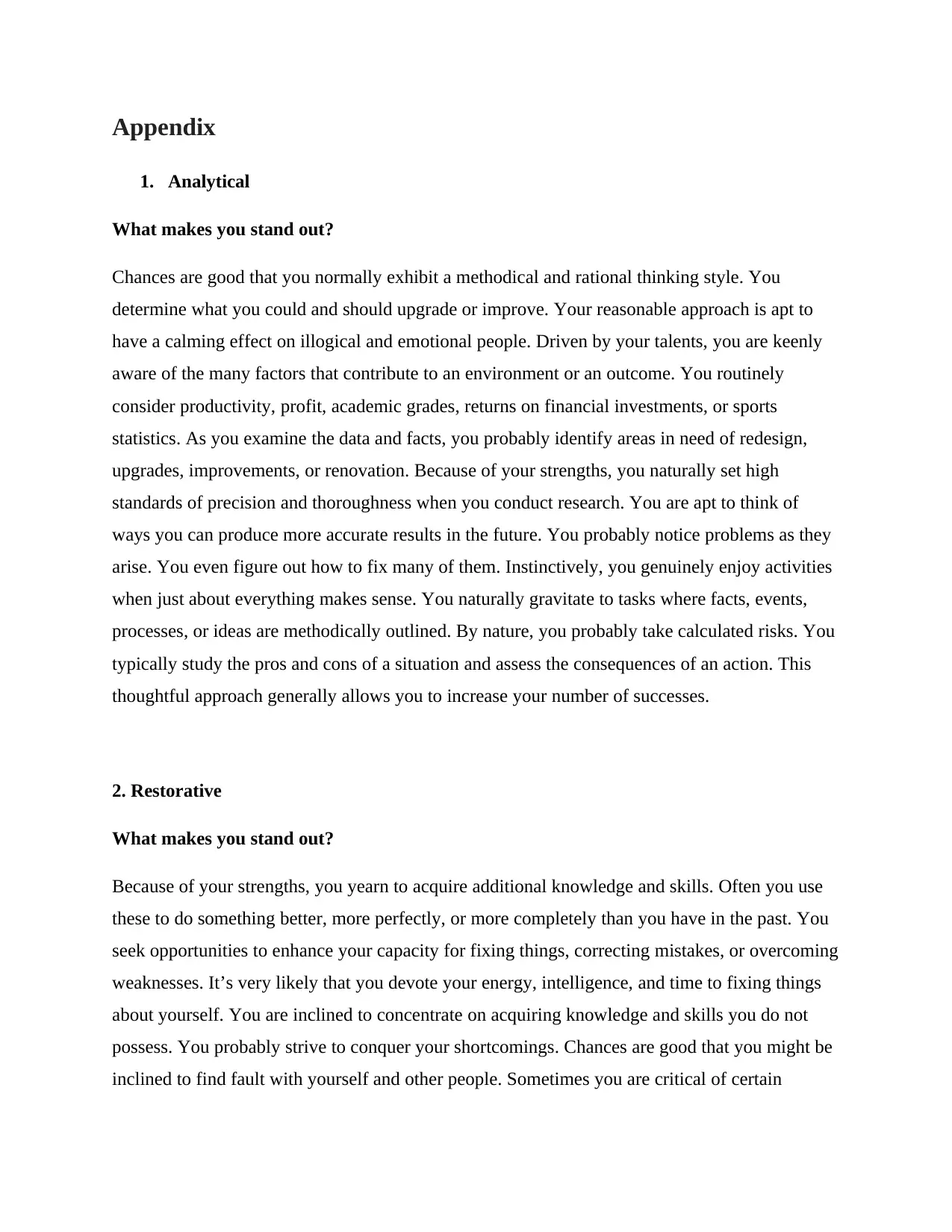
Appendix
1. Analytical
What makes you stand out?
Chances are good that you normally exhibit a methodical and rational thinking style. You
determine what you could and should upgrade or improve. Your reasonable approach is apt to
have a calming effect on illogical and emotional people. Driven by your talents, you are keenly
aware of the many factors that contribute to an environment or an outcome. You routinely
consider productivity, profit, academic grades, returns on financial investments, or sports
statistics. As you examine the data and facts, you probably identify areas in need of redesign,
upgrades, improvements, or renovation. Because of your strengths, you naturally set high
standards of precision and thoroughness when you conduct research. You are apt to think of
ways you can produce more accurate results in the future. You probably notice problems as they
arise. You even figure out how to fix many of them. Instinctively, you genuinely enjoy activities
when just about everything makes sense. You naturally gravitate to tasks where facts, events,
processes, or ideas are methodically outlined. By nature, you probably take calculated risks. You
typically study the pros and cons of a situation and assess the consequences of an action. This
thoughtful approach generally allows you to increase your number of successes.
2. Restorative
What makes you stand out?
Because of your strengths, you yearn to acquire additional knowledge and skills. Often you use
these to do something better, more perfectly, or more completely than you have in the past. You
seek opportunities to enhance your capacity for fixing things, correcting mistakes, or overcoming
weaknesses. It’s very likely that you devote your energy, intelligence, and time to fixing things
about yourself. You are inclined to concentrate on acquiring knowledge and skills you do not
possess. You probably strive to conquer your shortcomings. Chances are good that you might be
inclined to find fault with yourself and other people. Sometimes you are critical of certain
1. Analytical
What makes you stand out?
Chances are good that you normally exhibit a methodical and rational thinking style. You
determine what you could and should upgrade or improve. Your reasonable approach is apt to
have a calming effect on illogical and emotional people. Driven by your talents, you are keenly
aware of the many factors that contribute to an environment or an outcome. You routinely
consider productivity, profit, academic grades, returns on financial investments, or sports
statistics. As you examine the data and facts, you probably identify areas in need of redesign,
upgrades, improvements, or renovation. Because of your strengths, you naturally set high
standards of precision and thoroughness when you conduct research. You are apt to think of
ways you can produce more accurate results in the future. You probably notice problems as they
arise. You even figure out how to fix many of them. Instinctively, you genuinely enjoy activities
when just about everything makes sense. You naturally gravitate to tasks where facts, events,
processes, or ideas are methodically outlined. By nature, you probably take calculated risks. You
typically study the pros and cons of a situation and assess the consequences of an action. This
thoughtful approach generally allows you to increase your number of successes.
2. Restorative
What makes you stand out?
Because of your strengths, you yearn to acquire additional knowledge and skills. Often you use
these to do something better, more perfectly, or more completely than you have in the past. You
seek opportunities to enhance your capacity for fixing things, correcting mistakes, or overcoming
weaknesses. It’s very likely that you devote your energy, intelligence, and time to fixing things
about yourself. You are inclined to concentrate on acquiring knowledge and skills you do not
possess. You probably strive to conquer your shortcomings. Chances are good that you might be
inclined to find fault with yourself and other people. Sometimes you are critical of certain
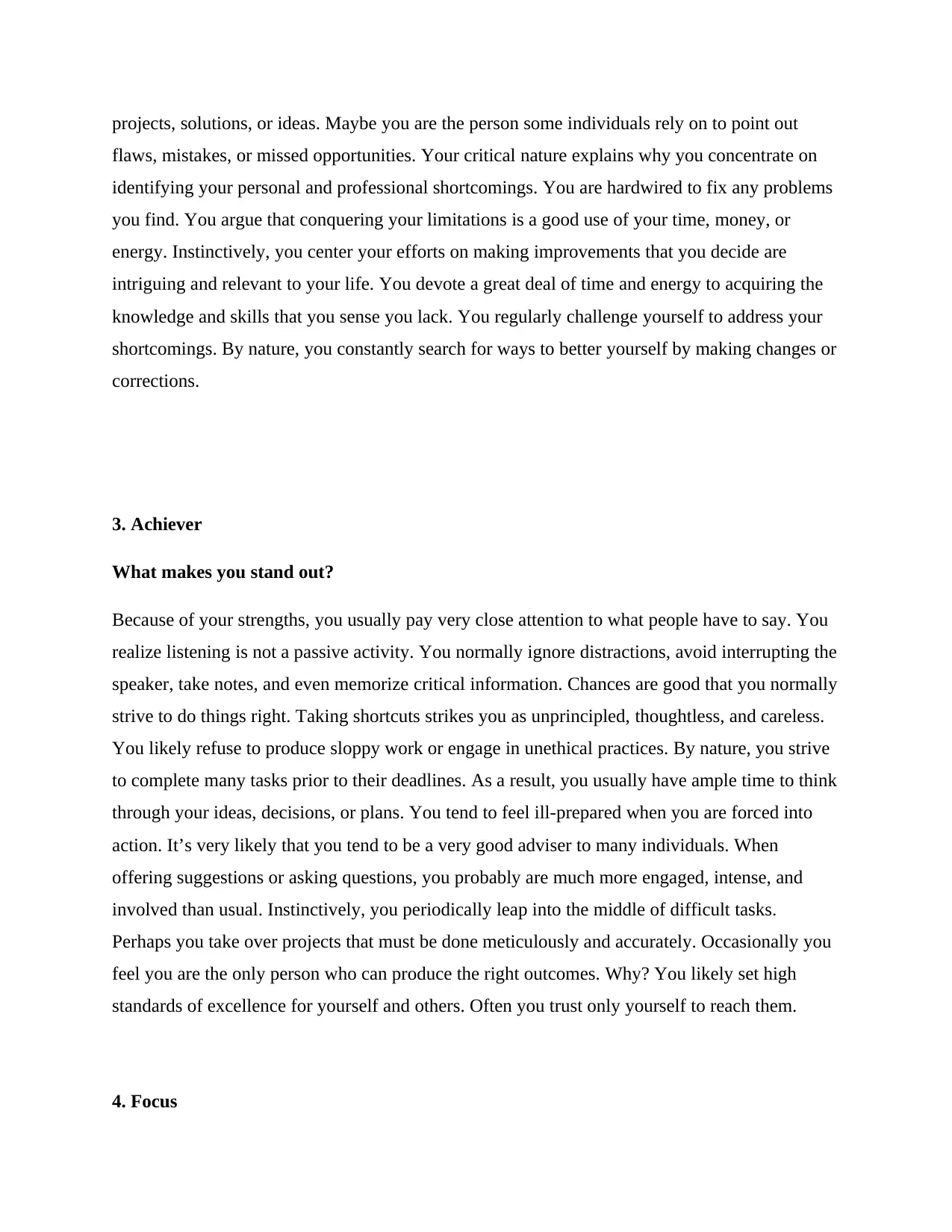
projects, solutions, or ideas. Maybe you are the person some individuals rely on to point out
flaws, mistakes, or missed opportunities. Your critical nature explains why you concentrate on
identifying your personal and professional shortcomings. You are hardwired to fix any problems
you find. You argue that conquering your limitations is a good use of your time, money, or
energy. Instinctively, you center your efforts on making improvements that you decide are
intriguing and relevant to your life. You devote a great deal of time and energy to acquiring the
knowledge and skills that you sense you lack. You regularly challenge yourself to address your
shortcomings. By nature, you constantly search for ways to better yourself by making changes or
corrections.
3. Achiever
What makes you stand out?
Because of your strengths, you usually pay very close attention to what people have to say. You
realize listening is not a passive activity. You normally ignore distractions, avoid interrupting the
speaker, take notes, and even memorize critical information. Chances are good that you normally
strive to do things right. Taking shortcuts strikes you as unprincipled, thoughtless, and careless.
You likely refuse to produce sloppy work or engage in unethical practices. By nature, you strive
to complete many tasks prior to their deadlines. As a result, you usually have ample time to think
through your ideas, decisions, or plans. You tend to feel ill-prepared when you are forced into
action. It’s very likely that you tend to be a very good adviser to many individuals. When
offering suggestions or asking questions, you probably are much more engaged, intense, and
involved than usual. Instinctively, you periodically leap into the middle of difficult tasks.
Perhaps you take over projects that must be done meticulously and accurately. Occasionally you
feel you are the only person who can produce the right outcomes. Why? You likely set high
standards of excellence for yourself and others. Often you trust only yourself to reach them.
4. Focus
flaws, mistakes, or missed opportunities. Your critical nature explains why you concentrate on
identifying your personal and professional shortcomings. You are hardwired to fix any problems
you find. You argue that conquering your limitations is a good use of your time, money, or
energy. Instinctively, you center your efforts on making improvements that you decide are
intriguing and relevant to your life. You devote a great deal of time and energy to acquiring the
knowledge and skills that you sense you lack. You regularly challenge yourself to address your
shortcomings. By nature, you constantly search for ways to better yourself by making changes or
corrections.
3. Achiever
What makes you stand out?
Because of your strengths, you usually pay very close attention to what people have to say. You
realize listening is not a passive activity. You normally ignore distractions, avoid interrupting the
speaker, take notes, and even memorize critical information. Chances are good that you normally
strive to do things right. Taking shortcuts strikes you as unprincipled, thoughtless, and careless.
You likely refuse to produce sloppy work or engage in unethical practices. By nature, you strive
to complete many tasks prior to their deadlines. As a result, you usually have ample time to think
through your ideas, decisions, or plans. You tend to feel ill-prepared when you are forced into
action. It’s very likely that you tend to be a very good adviser to many individuals. When
offering suggestions or asking questions, you probably are much more engaged, intense, and
involved than usual. Instinctively, you periodically leap into the middle of difficult tasks.
Perhaps you take over projects that must be done meticulously and accurately. Occasionally you
feel you are the only person who can produce the right outcomes. Why? You likely set high
standards of excellence for yourself and others. Often you trust only yourself to reach them.
4. Focus
⊘ This is a preview!⊘
Do you want full access?
Subscribe today to unlock all pages.

Trusted by 1+ million students worldwide
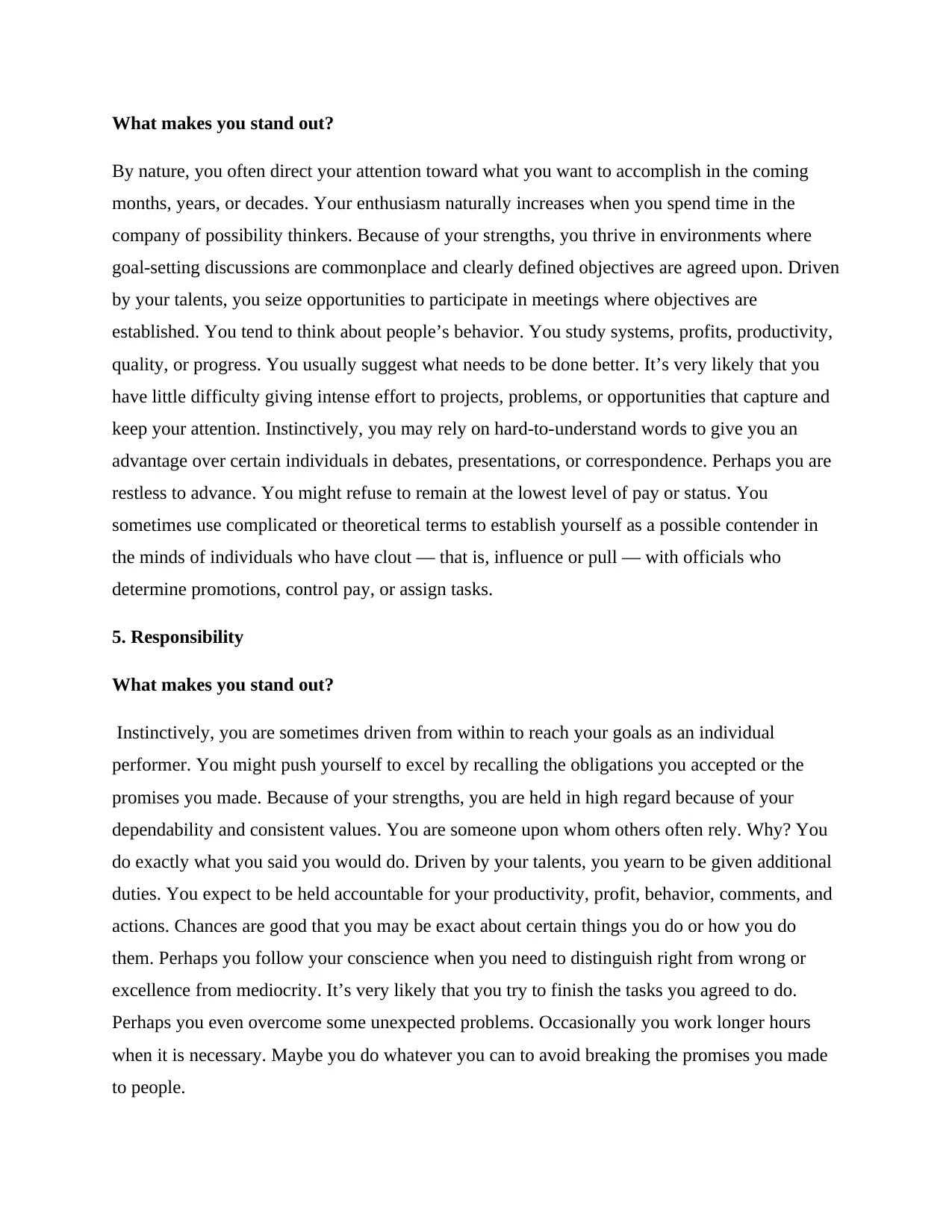
What makes you stand out?
By nature, you often direct your attention toward what you want to accomplish in the coming
months, years, or decades. Your enthusiasm naturally increases when you spend time in the
company of possibility thinkers. Because of your strengths, you thrive in environments where
goal-setting discussions are commonplace and clearly defined objectives are agreed upon. Driven
by your talents, you seize opportunities to participate in meetings where objectives are
established. You tend to think about people’s behavior. You study systems, profits, productivity,
quality, or progress. You usually suggest what needs to be done better. It’s very likely that you
have little difficulty giving intense effort to projects, problems, or opportunities that capture and
keep your attention. Instinctively, you may rely on hard-to-understand words to give you an
advantage over certain individuals in debates, presentations, or correspondence. Perhaps you are
restless to advance. You might refuse to remain at the lowest level of pay or status. You
sometimes use complicated or theoretical terms to establish yourself as a possible contender in
the minds of individuals who have clout — that is, influence or pull — with officials who
determine promotions, control pay, or assign tasks.
5. Responsibility
What makes you stand out?
Instinctively, you are sometimes driven from within to reach your goals as an individual
performer. You might push yourself to excel by recalling the obligations you accepted or the
promises you made. Because of your strengths, you are held in high regard because of your
dependability and consistent values. You are someone upon whom others often rely. Why? You
do exactly what you said you would do. Driven by your talents, you yearn to be given additional
duties. You expect to be held accountable for your productivity, profit, behavior, comments, and
actions. Chances are good that you may be exact about certain things you do or how you do
them. Perhaps you follow your conscience when you need to distinguish right from wrong or
excellence from mediocrity. It’s very likely that you try to finish the tasks you agreed to do.
Perhaps you even overcome some unexpected problems. Occasionally you work longer hours
when it is necessary. Maybe you do whatever you can to avoid breaking the promises you made
to people.
By nature, you often direct your attention toward what you want to accomplish in the coming
months, years, or decades. Your enthusiasm naturally increases when you spend time in the
company of possibility thinkers. Because of your strengths, you thrive in environments where
goal-setting discussions are commonplace and clearly defined objectives are agreed upon. Driven
by your talents, you seize opportunities to participate in meetings where objectives are
established. You tend to think about people’s behavior. You study systems, profits, productivity,
quality, or progress. You usually suggest what needs to be done better. It’s very likely that you
have little difficulty giving intense effort to projects, problems, or opportunities that capture and
keep your attention. Instinctively, you may rely on hard-to-understand words to give you an
advantage over certain individuals in debates, presentations, or correspondence. Perhaps you are
restless to advance. You might refuse to remain at the lowest level of pay or status. You
sometimes use complicated or theoretical terms to establish yourself as a possible contender in
the minds of individuals who have clout — that is, influence or pull — with officials who
determine promotions, control pay, or assign tasks.
5. Responsibility
What makes you stand out?
Instinctively, you are sometimes driven from within to reach your goals as an individual
performer. You might push yourself to excel by recalling the obligations you accepted or the
promises you made. Because of your strengths, you are held in high regard because of your
dependability and consistent values. You are someone upon whom others often rely. Why? You
do exactly what you said you would do. Driven by your talents, you yearn to be given additional
duties. You expect to be held accountable for your productivity, profit, behavior, comments, and
actions. Chances are good that you may be exact about certain things you do or how you do
them. Perhaps you follow your conscience when you need to distinguish right from wrong or
excellence from mediocrity. It’s very likely that you try to finish the tasks you agreed to do.
Perhaps you even overcome some unexpected problems. Occasionally you work longer hours
when it is necessary. Maybe you do whatever you can to avoid breaking the promises you made
to people.
1 out of 7
Related Documents
Your All-in-One AI-Powered Toolkit for Academic Success.
+13062052269
info@desklib.com
Available 24*7 on WhatsApp / Email
![[object Object]](/_next/static/media/star-bottom.7253800d.svg)
Unlock your academic potential
Copyright © 2020–2026 A2Z Services. All Rights Reserved. Developed and managed by ZUCOL.



